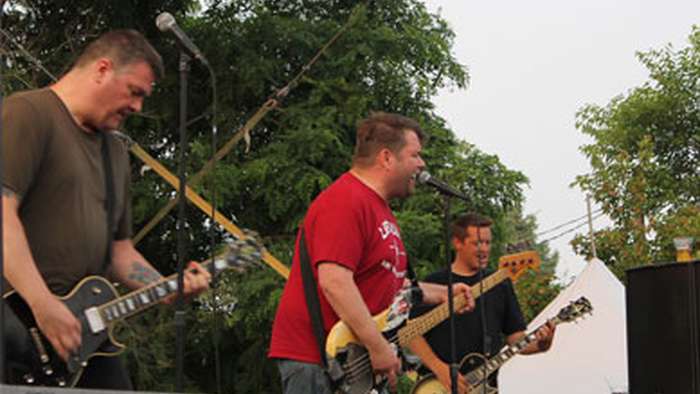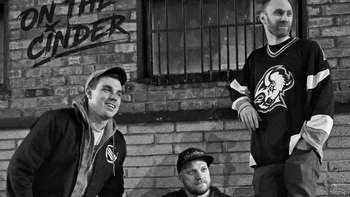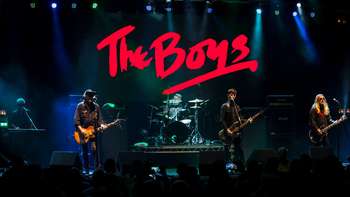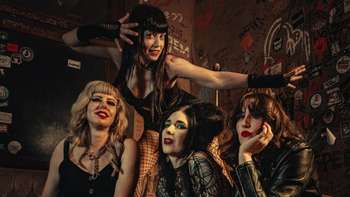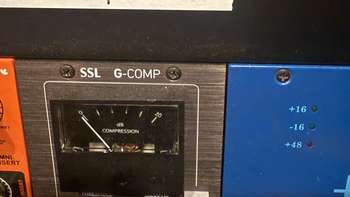A long, long time ago, Scene Point Blank sat backstage at the Triple Rock before a Dillinger Four show. The goal was to capture an oral history of the band. How they formed, what stood out in creating each record, and notable moments in their career. Basically a play-by-play from the band.
D4 does things their own way at their own pace. It’s one of the key points in this interview, which got us partway through the history before soundcheck killed the momentum and we intended to pick it up another day.
That day has yet to come, so what was once to be a 20th anniversary article was pushed back. I’d cleverly planned the backup title of “Now That You’re 21” -- back in 2015, I guess. Here were are in 2019, with the band at 25 years old.
A Semi-Chronological, Semi-Linear Oral History, Pt. 1
Erik Funk: Paddy and I met my freshman year in high school. He was a year older than me and I joined a band he was already in called Billingsgate. I don’t think it was even called that yet. I was a metalhead and Paddy was suspicious of me but I could play guitar well enough to play the songs that he wanted to play in the band. He just sang.
That was our high school band and it kind of morphed over time. We ended up being Victory Records #2 (VR002).
We put out an LP. We were touring and going around in the hardcore scene when we were in high school. In the summers we were full-on touring. That’s how we met a lot of people.
Scene Point Blank: That’s in 1990-91?
Erik Funk: The 7” I think we did in 1990 and the LP in 1991.
Anyhow, we did that band. [Then] Paddy went to school in Green Bay, Wisconsin. I came up here to join another hardcore band called Bloodline. I played in that band, he went to school. And after one year of school in Green Bay, I was like, “Dude, just come to Minneapolis.” It wasn’t working out there for him school-wise.
He came to Minneapolis. “We’ve always been in hardcore bands. It would be fun to do a punk band.”
I met Lane in college, he played drums. We brought Paddy up and he had learned how to play bass that year he was in Green Bay—just to play with his band there. He had sung before that, but he taught himself how to play bass a little bit and there was this other guy that went to school with us that was going to sing. We were just going to goof around and play parties.
We kicked that dude out. “Let’s try to do originals and try to be a more serious band.”
That’s what we did. I think we played our first show in the spring of ’94 as Dillinger Four. There were three of us and we actually never planned -- when we chose the name Dillinger Four we weren’t planning to be a four-piece. We thought we were going to be a three-piece and therefore the name was a little more clever because of how many people were in the band. Then when we started playing, “Ah, we should have another guitar player.”
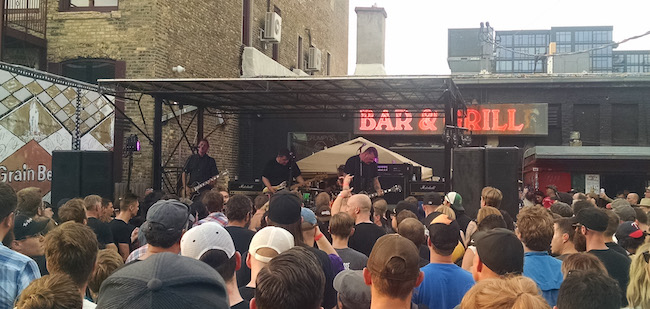
Erik Funk: This is just a point-by-point. Sloan Lorsung was playing in a local band called Bombsite. He decided to play with us. We recorded our first 7”. He didn’t play on it but we put his picture on it because he joined the band before it came out the following summer. In the summer of ’95, we went on our first full summer tour with Scooby Don’t, who were another active local band at the time--Billy was in that band. That tour was supposed to be 5-6 weeks long. We pieced it together. Scooby Don’t had a lot of van trouble and didn’t make it through all of it but, by the end, Sloan was out and it was obvious Billy was going to be in the band.
Billy Morrisette: It was Scooby Don’ts last tour too. At the end of the tour two of the guys were leaving the state.
Erik Funk: So it wasn’t really going to be an active band anymore.
Billy Morrisette: That was like the last hurrah for Scooby Don’t.
Erik Funk: Billy was an obvious fit. We had already been hanging out. We’ve been the same four guys since the summer of ’95.
Scene Point Blank: It was just the first 7” that wasn’t the four of you?
Erik Funk: I don’t have the date of which year was what, but we put out the first 7”, The Kids Are All Dead. It was probably that year or not too long after. Then we did the Mutant Pop 7” and also the split with The Strike somewhere in there. And we did all that before we released our first album, which came out in the summer of ’98. Basically in those four years we put out a lot of 7”s and we toured a lot in that time.
It’s funny because that’s a long time. A lot of people aren’t bands for four years.
Billy Morrisette: It was a different time. It was a big deal to have a 7” back then. Bands did demo cassettes. [When] you got a 7” out: “Whoa, you guys got a record!”
Erik Funk: It was legitimizing. You are a little ahead of the other bands because you got a 7” out.
Paddy Costello: The 7” threshold is when somebody is big enough to call big.
Erik Funk: Tad Keyes of Dirt Poor put on the first show that we ever played.
Paddy Costello: He actually made us. The only reason that we are a band is because Tad from Dirt Poor made us play a show. He made a flyer for a secret show in a warehouse space and put our name on it. He handed it to me at work because we worked together. There, now you have to play.
Erik Funk: We only had 5 songs and I don’t think we had words yet.
Paddy Costello: We weren’t even definitely Dillinger Four yet, we were still picking around names. And we were a three-piece which was the dumbest shit in the world.
Erik Funk: Paddy and I played that show…[Later] we drove to Chicago together. We were listening to a board tape somebody made of [an early show]. “Ah, this singing thing is not a good idea for me…”
I wanted to [sing]. I thought I could but, each time I’d do it and get a tape or something, “This isn’t working.”
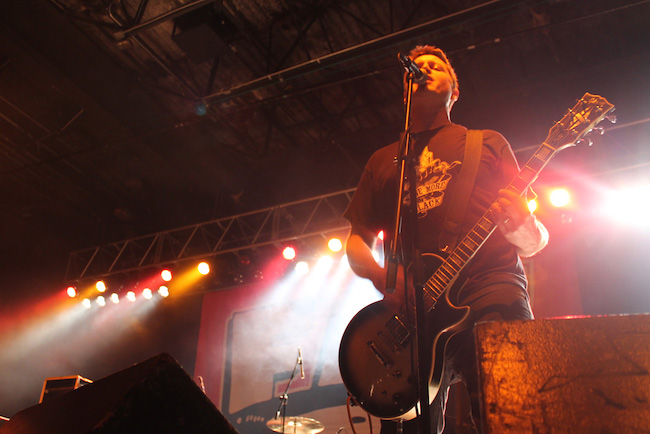
Paddy Costello: When we first started I couldn’t play well enough to play bass and sing at the same time. Whenever I sang, I’d sing and play the note and jump back in and sing.
Erik Funk: And Paddy had sung in bands before but it was always hardcore bands. We were going to try more singing, less straight yelling. We weren’t totally sure he’d be able to do that either.
Paddy Costello: I actually distinctly remember at one basement in St. Paul, you bringing up to me, “Dude, nothing personal but it was a little off,” because I was trying to sing sing, and I remember you being like, “Just belt it out.” Not singing, just yelling. I went with that. It’s been 21 years.
Laughs.
Paddy Costello: Purely anecdotally, I remember the first time I thought, “Oh my god, this is getting bigger than just the goofy shit we thought we were doing.” We did a tour when the first 7” was out. We went to the West Coast for a couple of weeks. We came back for a show at House of Kung Fu. We drove in the day of the show, we were getting off the highway. This is a house that was near the Metrodome in downtown Minneapolis and as we were pulling up -- we were playing with Impetus Inter -- I remember we pulled up to the house and there were tons of people. There were people in the yard, everywhere, and I remember thinking, “Holy Shit, Impetus Inter has blown up while we’ve been gone.”
We had been gone for maybe a month and that’s when Rev105 started playing a song off the first 7”, but we didn’t know because we’d been gone. We put out the 7” and we went on the road. We came back and there were all these people. We just assumed it was Impetus Inter. We were like, “We’ve been wasting all this time on the road and these guys…Then we showed up and all these people where there to hear this one song, the song they heard on the radio, and half of them were, “What are we doing at a house?”
Billy Morrisette: There was a huge wave of creativity going on in the punk scene at that time. That’s the same time Extreme Noise is starting, that’s the same time that No Slow…All Go, the compilation, was coming out.
Scene Point Blank: And nationally, to a different level.
Erik Funk: By ’95 or ’96 it was already not weird for Scooby Don’t or us to play shows with Misery or Assrash. That was unique to Minneapolis.
